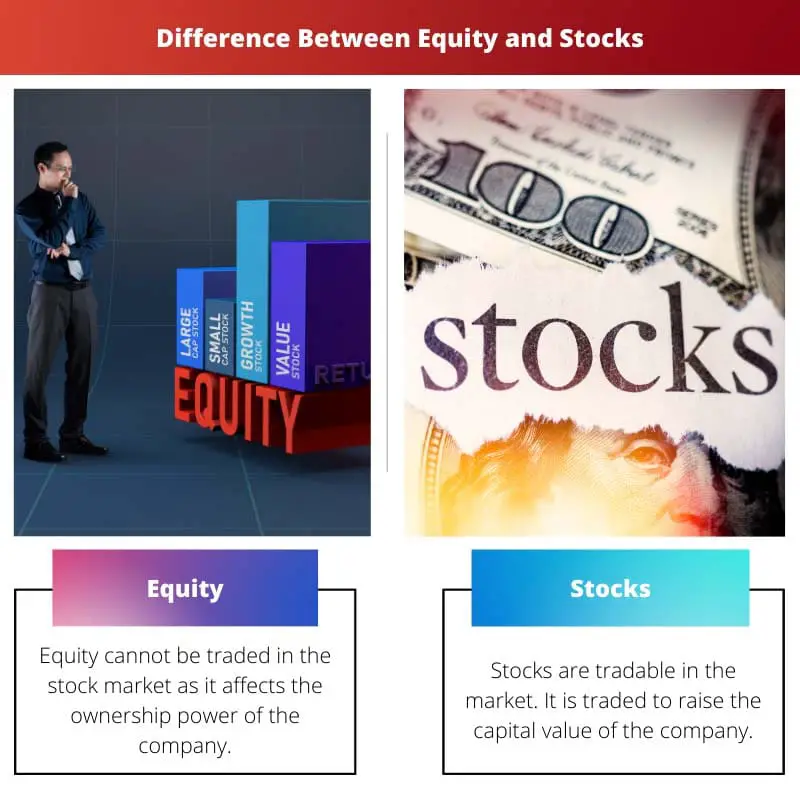Either in the Corporate world or Stock market exchange, Equity and Stocks are used as a unit of measurement of ownership of anybody in the respective company.
Though both the terms are commonly mistaken for each other, however, there is a small margin of difference between them.
Even if one difference is aligned between Equity and Stocks it is pertinent to know a fact. When the company registers itself on the stock exchange board to commence the trading of ownership, the Equity is then considered as Stock.
Key Takeaways
- Equity represents ownership in a company, while stocks are specific units of that ownership.
- Stocks can be traded on exchanges, whereas equity is a broader term encompassing various forms of ownership.
- Stocks can generate dividends, while equity may include retained earnings and additional paid-in capital.
Equity vs Stock
The difference between Equity and Stock is that equity is issued to potential private clients, giving them part of the ownership of the company by taking their investment capital. In contrast, Stocks are those part of Equity shares that are offered and issued to the public. These are also issued by offering ownership part in the company and utilising investment as raised capital of the firm.

Generally, Equity represents the residual money that would be given to the Equity shareholder. It is payable after all the company’s debt or liabilities are paid off.
The stock of any company represents the unit owners of that particular company. There are numerous types of stocks issued to investors on various parameters.
Comparison Table
| Parameters of Comparison | Equity | Stock |
|---|---|---|
| Trading in the Stock market | Equity cannot be traded in the stock market as it affects the ownership power of the company. | Stocks are tradable in the market. It is traded to raise the capital value of the company. |
| Presence in the corporate world | Equity is present in all types of business forms. For example – sole proprietor, partnership, joint ventures, multi national companies, etc. | Stock is present only in big businesses and companies. It may be not available in a small enterprise. |
| General Public | Equity is not offered, issued to the general public. There’s no kind of involvement of the public in these. | Stocks include offering to the public. Stocks are purchased and sold to the general public based on ROI. |
| Price | The value of Equity doesn’t vary with market forces. These are not tradable so, there’s no issue of price oscillation in it. | Stocks are exchanged in the market and thus their value varies with market forces, demand and supply. |
| Risk involved | Equity holders are directly liable for all the debt of the company. hence, Equity has more scope of risk involved in it. | Stockholders are only liable up for the investment made by them. They wouldn’t bear the company’s all debt at all. And hence, it has a lesser risk involved in it. |
What is Equity?
Equity represents ownership up to the extent of the investment in a company. It is also known as Shareholder Equity. It indicates the amount of money that is left after all liabilities payments.
It appears on the right side of the balance sheet under ‘Assets’. Equity aids in the assessment of the financial soundness of a company.
It also attracts investors in terms of stipulating the best Return on Investment (ROI). Equity is not listed in the stock exchange for trade, which makes them free from market forces.
The Price of Equity does not oscillate and thus gives more power to its shareholder.
Equity = Total Assets – Total Liabilities

What is Stock?
Stock is the unit of distribution of a company’s ownership. A person having stocks in any company is benefited through the company’s revenue, profits, voting power, etc.
The Stocks are distributed in the proportion of investment made by investors. There are various types of Stocks issued with more or less the same benefits and authority.
Stocks are the capital value that is raised by a company by offering and issuing shares to the general public. Broadly, there are two kinds of stock: common stock and preferred stock. Both the stockholders are entitled to dividends and ownership with varying differences.

Main Differences Between Equity and Stock
- Equity includes stock under it, but not all stock is Equity. Equity is not listed on the stock exchange market for trade as it will hamper the ownership functioning of the company. In contrast, Stock is purposely listed on the exchange market with the intention of raising capital value.
- While Stocks have the involvement of the general public offering them, there’s no direct public involvement in the case of the issue of Equities. These are mostly issued to potential private clients. To monitor and ensure the smooth functioning of a stock trade in the market, there’s a higher regulatory body, SEBI, to perform, whereas issuing of Equity doesn’t involve any higher body.
- Equity does indicate the net worth of the company after the clearance of all debts and outside liabilities. It is mentioned on the ‘Assets’ side of the Balance sheet. In contrast, the stock value of a company represents the worth and credibility of the company in the market only. It is not mentioned in the balance sheet separately.
- Though both, Equity and Stock is the way of investing and getting full and partial ownership of the company, Equity holder has long-term relationships and intend to have long-term profit. While stockholders intend to have only short-term profit.
- While, merging and amalgamation of firms, the value of Equity doesn’t get counted in valuation. whereas Stock value is considered at the time of amalgamation and merging of the firm or enterprise.

- https://onlinelibrary.wiley.com/doi/abs/10.1111/j.1540-6261.1990.tb02425.x
- https://academic.oup.com/qje/article-abstract/118/3/969/1943017

I appreciate the in-depth explanations provided for both equity and stock in this article.
This is a great resource for anyone looking to understand the differences between equity and stocks.
Yes, the relevance and differences of these concepts are well-highlighted here.
The comparison table is particularly helpful in illustrating the differences. Thank you for breaking it down so clearly.
Absolutely, the table simplifies the comparison and makes it easier to comprehend.
Great article! Very informative and well-explained differences between equity and stocks.
I couldn’t agree more. The distinction between equity and stocks is crucial for investors to understand.
This article provides a comprehensive understanding of equity and stocks. I appreciate the clarity of the explanations.
Completely agree. The author has done a great job in breaking down these concepts.
I appreciate how this article delves into the risk involved with equity and stocks. Very insightful.
Yes, understanding the risks is crucial for anyone considering investment in equity or stocks.
The explanation of where equity and stocks are present in the corporate world is quite illuminating. It helps clarify their usage.
Absolutely. The distinction provided is key in understanding the business landscape.
The distinction between equity and stock in terms of risk involved is particularly crucial for investors to be aware of.
Absolutely, understanding the risks is fundamental for investment decisions.
Thank you for providing such a detailed and informative comparison between equity and stock. Very helpful!
The explanations for what equity and stock are, and their differences, are very well articulated.
The distinction between equity and stock in the corporate world is made very clear in this article.
I couldn’t agree more. Understanding these terms is fundamental for investors.
Absolutely. The article provides comprehensive insights into these concepts.